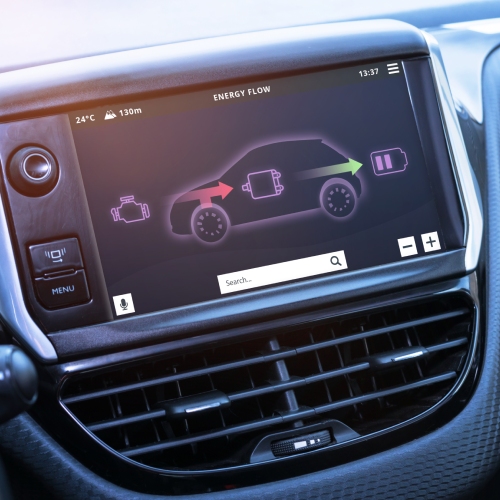Urban mobility
Urban mobility
How can we make urban transport more sustainable?

All about electric car batteries
Driving the mobility of the future
In the path towards sustainable mobility, electrification arises as an efficient and quiet alternative, which can play an important role in the reduction of Greenhouse Gas (GHG) emissions. Together with renewable fuels and hydrogen, it is one of the pillars of Repsol's strategy to advance towards the decarbonization of transport.


What is an electric car battery and how does it work?
Electric car batteries act an as energy accumulator, where electricity is stored that is then transmitted to the engine, in order to make the functioning of the vehicle possible.
The process is simple and efficient. When the electric car is plugged into an electrical outlet, the battery is charged with electricity, similar to filling a fuel tank. While the electric vehicle is in motion, the battery supplies the energy needed for operation, providing a quiet, emission-free driving experience. When the battery runs out, simply repeat the charging process to enjoy mobility again.
It's important to highlight that there are different types of electric car batteries, each one with its own capacity and power, but all of them share the same fundamental principle of generating, storing, and supplying energy to power the vehicle.
How long does an electric car battery last?
Electric car batteries currently offer an average range between 250 and 500 kilometers with a single charge. However, you have to bear in mind that this range can vary significantly depending on the vehicle model, as well as the capacity, power, and type of battery.

There are multiple factors that can influence the range of these vehicles. One of them is the climate.
Another relevant factor is the amount of resources that the vehicles uses, such as the use of electric accessories and additional functions that can impact the performance of the battery.
Therefore, before choosing an electric car model it's important to bear in mind all these aspects, as they affect the vehicle's range. In any case, battery technology continues to evolve, and manufacturers are working to improve their efficiency and increase the range of cars.
How long does a battery take to charge?
The charging of electric car batteries is carried out by specific charging stations. Connecting the vehicle to the station through a specific connector starts the charging process, the duration of which depends on several factors. These include the capacity of the electric vehicle battery, the current charge level, the power of the car battery, and, of course, the capacity of the station itself.
Depending on the electric power they offer, there are different types of charging stations, each one with a different charging time. For example, slow charging stations can require between 4 and 8 hours to complete the battery, while ultra-fast charging stations are capable of filling up to 80% of the battery in just 10 minutes. The fours types of electric charging are the following:
Slow charging
This is the most common option for charging cars at home. Normally, it takes 4 to 8 hours to complete the vehicle's charging. This method requires a charger that works with single-phase AC.
Semi-fast charging
Intermediate speed charging generally takes between 1 and 3 hours to complete charging the vehicle. This charging method can be found in parking lots, shopping malls, or private garages.
Fast charging
It can reach 80% of your car's battery in about half an hour. These fast charging points are usually located at service stations or on public roads, as they require special DC chargers with a capacity of 50kW.
Ultra-fast charging
Your battery will be ready in 5-10 minutes. It's a very convenient option for long journeys and can only be found at service stations. The fastest charging systems are only compatible with certain electric cars, such as the Porsche Taycan or the Audi e-tron GT.
We can drive your technology project
We can assist and advise you to pursue excellence in innovation.
Tips to look after your electric car's battery
The battery is one of the most important elements of your electric car, and in order to ensure optimal performance and prolong its useful life, you can follow these tips:
Urban mobility
How can we make urban transport more sustainable?

Sustainable mobility
Discover everything about sustainable mobility, the sustainable transport of the future.